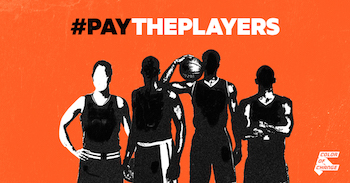The NCAA is making billions off the backs of unpaid Black athletes.
Tell the NCAA to drop the amateurism rules and allow players to profit off of their own images.
Dear friend,
March Madness begins. Over the next three weeks, student-athletes will become legends as they strive to reach the Final Four. Like many of you, I love this time of year - the frenzied pace, desperation shots, rooting for the underdogs. However, I’m also intimately familiar with the exploitative nature of college sports and how even the stars that shine this month are still just unpaid laborers supporting the billion-dollar behemoth that is the NCAA. I know this because my dad was one of those stars. While leading upstart New Mexico State to the Final Four in 1970, he earned national accolades and found himself on the cover of Sports Illustrated. But while his image was being used to sell magazines across the country, he lived in relative poverty and had to scramble to make ends meet financially.
Fast forward 50 years and things are as bad as ever for student-athletes. While the NCAA rakes in billions in TV revenue, fired coaches receive 8-figure payouts, and shoe companies flood athletic departments with multi-million-dollar apparel deals, players see none of it. In fact, they can be ruled ineligible and have their reputations sullied simply by having someone pay for their dinner.
Black athletes are disproportionately impacted by the NCAA's draconian policies, in particular, the rules that say that in order to maintain “amateur status” and thus be eligible to play, athletes cannot accept any money or gifts. Even though Black students only make up about 3 percent of all full-time students, Black athletes make up more than half of the players on the largest revenue sports, football and basketball.1 2 In 2015, the top programs made a combined $9.1 billion, and the NCAA itself just signed $8.8 billion dollar TV deal with CBS to air its March Madness tournament. Yet these players are criminalized if they dare try and turn their skills and labor into a source of income. Because of practice and game schedules combined with their academic courses, many athletes cannot work while under scholarship and often go hungry or have difficulty paying rent as a result.3 4
This has to change - other sports institutions, like the Olympics, changed their rules about amateurism over 30 years ago to allow their athletes to financially benefit, the NCAA should follow suite.5
Removing the "amateur status" rules would also kill the black market that currently allows agents and shady middlemen to prey on young talent, with the athletes taking the fall when their hands get caught in the proverbial cookie jar.6 Even though it’s Black athletes generating the money, white coaches, corporations, agents, school administrators and predominantly white schools reap the rewards and serve as modern-day overseers.7 More than 82 percent of college basketball coaches are white, over 92 percent of top division head football coaches are white, and more than 86 percent of conference commissioners are white - with not a single person of color ever serving as commissioner of one of the “Power Five” conferences.8 9 Yet these people regularly make $500,000 a year, with some making multi-millions each year.
In the big-money sports environment, where the historical pattern of white profit from Black bodies is regularly apparent, it’s time that the NCAA let athletes financially benefit from their work to build this exploitative sporting empire.
Until justice is real,
Brandi, Rashad, Arisha, Evan, Jade, Johnny, Future, Corina, Chad, Mary, Angela, Saréya, Eesha, and the rest of the Color Of Change team
References :
- "The difference in how much money schools make off of college sports is jarring, and it is the biggest obstacle to paying athletes", Business Insider, 14 October 2016 http://act.colorofchange.org/go/28175?t=8&akid=9930%2E1942551%2EC6gtMN
- "The NCAA's new March Madness TV deal will make them a billion dollars a year", SB Nation, 12 April 2016 https://act.colorofchange.org/go/25769?t=10&akid=9930%2E1942551%2EC6gtMN
- "National champ U-Conn.’s Napier says he goes to bed starving", Washington Post, 4 April 2016 https://act.colorofchange.org/go/28176?t=12&akid=9930%2E1942551%2EC6gtMN
- "Ole Miss' Bo Wallace: Shabazz Napier was right, players go hungry at night", CBS Sports, 17 July 2014 https://act.colorofchange.org/go/28177?t=14&akid=9930%2E1942551%2EC6gtMN
- "OLYMPICS TO ALLOW PROS IN 3 SPORTS", New York Times, 1 March 1985 https://act.colorofchange.org/go/28178?t=16&akid=9930%2E1942551%2EC6gtMN
- "This Is How To Pay College Athletes", Deadspin, 6 March 2018 https://act.colorofchange.org/go/28179?t=18&akid=9930%2E1942551%2EC6gtMN
- "College sports exploits unpaid black athletes. But they could force a change.", Washington Post, 8 January 2016 https://act.colorofchange.org/go/28179?t=20&akid=9930%2E1942551%2EC6gtMN
- "The 2012 Racial and Gender Report Card : College Sport," The Institute for Diversity and Ethics in Sport (TIDES) at the University of Central Florida (UCF), 10 July 2013 https://act.colorofchange.org/go/28180?t=22&akid=9930%2E1942551%2EC6gtMN
- "Regression throughout Collegiate Athletic Leadership: Assessing Diversity among Campus and Conference Leaders for Football Bowl Subdivision (FBS) Schools in the 2015-16 Academic Year," The Institute for Diversity and Ethics in Sport (TIDES) at the University of Central Florida (UCF), 11 November 2015 http://act.colorofchange.org/go/28181?t=24&akid=9930%2E1942551%2EC6gtMN

Color Of Change is building a movement to elevate the voices of Black folks and our allies, and win real social and political change. Help keep our movement strong.


Aucun commentaire:
Enregistrer un commentaire